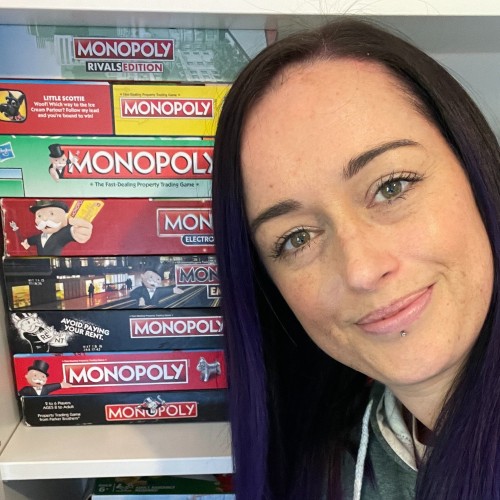Considering how long Monopoly has been played for, and how popular it is around the world, you would think that the rules of the game were burned into our brains by this stage.

However, there are actually a lot of people who play Monopoly regularly who don’t know all of the rules. And some people just plain play it wrong.
With that in mind, here’s a summary of all of the rules you need for a standard game of Monopoly. If you want to play the game as it was intended, these are the rules you need.
Setting Up The Game
The first step in playing Monopoly is making sure the game is properly set up. Here’s a look at everything you need to do in order to get ready to play Monopoly.
1. Decide who’s playing
Monopoly is officially advertised as being for 2-6 players, although you can play it with up to eight players. Generally, four is the optimum number of players if you want a balance of speed and difficulty. Having fewer or more players can slow you down.
It’s no surprise that having fewer players means a slower game – as you’ll have to wait longer for every property to be owned. But the more players you have, the harder it can be to complete a color set, and if players aren’t willingly trading it can keep rent levels low and drag the game out.
Read more: How Many People Can Play Monopoly?
Monopoly is suitable for children aged eight and up. For younger kids, there are Monopoly Junior games that are ideal for those aged 5-8. The Monopoly Junior rules are even simpler.

2. Give out the money
In traditional Monopoly board game rules, every player starts with the same amount of money – $1,500. This should be divided as 2 x $500 bills, 4 x $100 bills, 1 x $50 bill, 1 x $20 bill, 2 x $10 bills, 1 x $5 bill and 5 x $1 bills.
The rules were changed in 2008, so if you have an older Monopoly game, you might be told a different configuration of notes. The money has always been $1,500 total, but it used to be made up of fewer $100 bills, and more $50, $20 and $10 bills.
While these money amounts apply to most games, not all Monopoly rules are the same – some games use different currencies, either of a higher value or specific to a theme.
Read more: How Much Money Do You Start With in Monopoly?
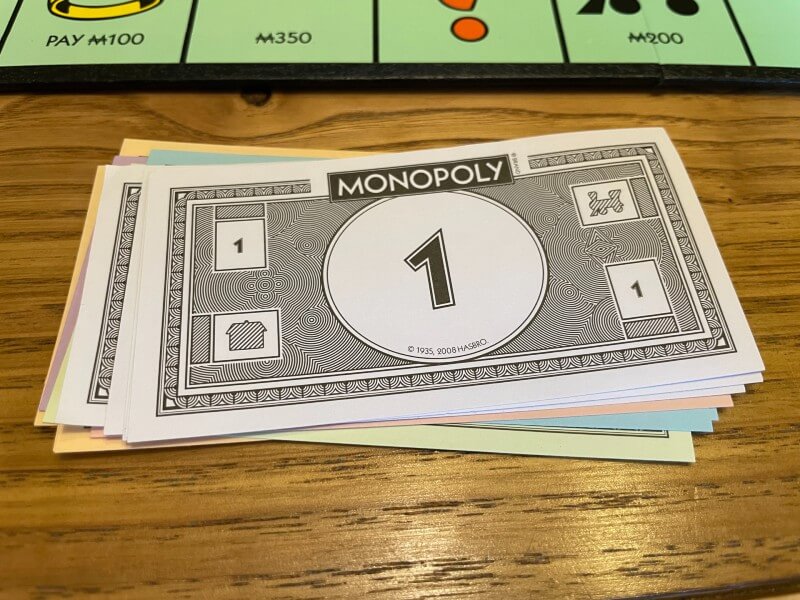
3. Choose a banker
Every game of Monopoly needs to have a nominated banker. Their role is to manage the funds of the bank, act as a manager of auctions, and distribute properties, houses and hotels.
The banker is not an extra person – someone playing the game should double up their roles.
This means it’s really important that the banker can easily keep their own funds separate from the bank’s funds. Most people use the game box as the ‘bank’ to help with this. Just make sure the banker has enough space around the table so that they don’t get confused.
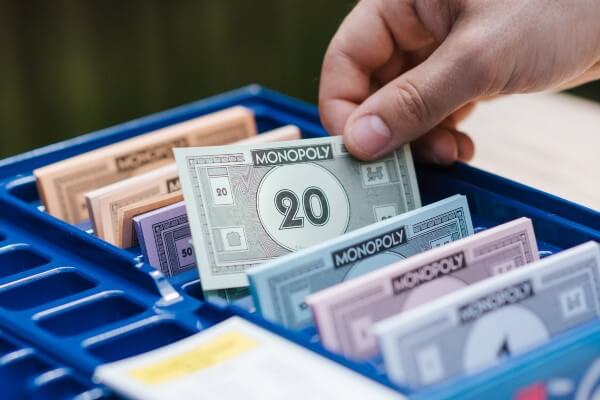
4. Choose a playing piece
Every player in Monopoly must have a token – a playing piece that they will use to move around the board. There are eight included with the game – the race car, the top hat, the thimble, the dog, the battleship, the cat, the penguin and the rubber ducky.
However, while these are included for your convenience, you don’t have to use one of these playing pieces. You can use any token to represent yourself, as long as it fits on the board and you can easily tell that it is yours. The rules for Monopoly don’t stop you from using something personal to you.
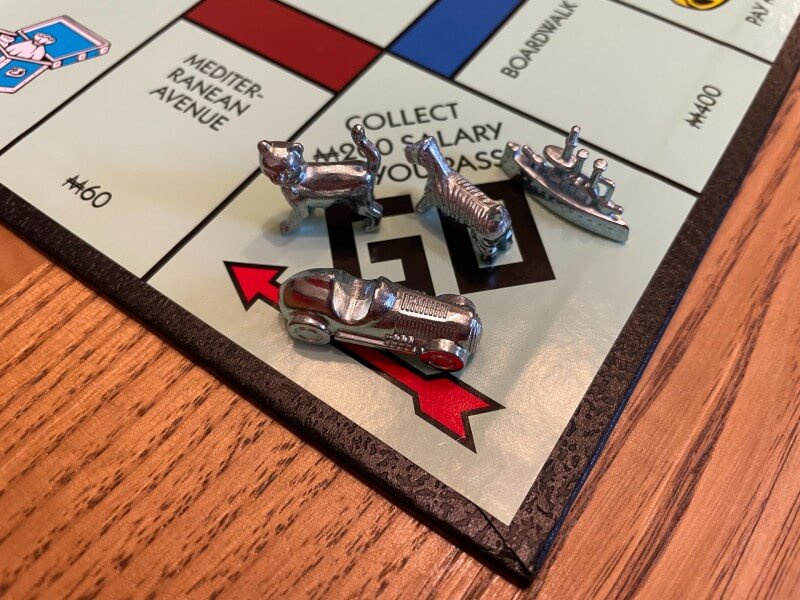
5. Find the dice
A game of Monopoly requires two regular six-sided dice, and these should be rolled by the player together when they take their turn.
Two dice will be included with the game but you can use any regular six-sided dice if you have lost them, or you have your own that you would prefer.
The standard version of Monopoly does now include a Speed Die as well, but this is not to be used when following the ‘Classic’ Monopoly rules. It is used for speed games, where other rules also change.
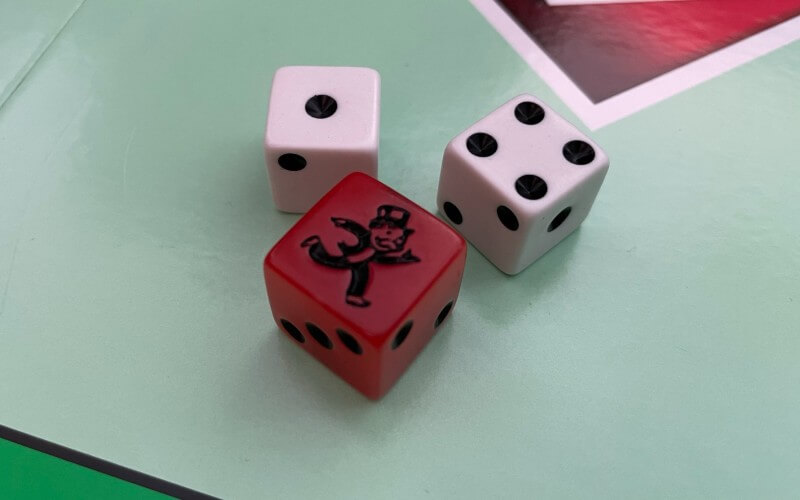
6. Place the Chance & Community Cards on their spots
There are 16 Chance and 16 Community Chest cards in a standard game of Monopoly.
The banker should check that all cards are present at the start of the game, separating them out if needed. The banker should then shuffle the cards and place them in the correct locations on the board.
There are different rules around how to use these cards, but we’ll get to that when we talk about the spaces and what they mean.
Playing The Game
OK, you have the board set up, the banker is nominated, and everyone has their starting cash. Let’s now look at how a game pans out according to the official Monopoly rules.
Who goes first in Monopoly?
To begin a game of Monopoly, all players should take a turn rolling both dice. Whoever scores the highest on their roll will be the first player to take a turn, and then from there play progresses in a clockwise order.
If two or more players tie for the top roll, only those players should roll again, until a clear winner has been decided.
Again, the second player will be the next player around the table clockwise. So even if you roll terribly, you might still end up as the second player.
Read more: How to Start a Monopoly Game
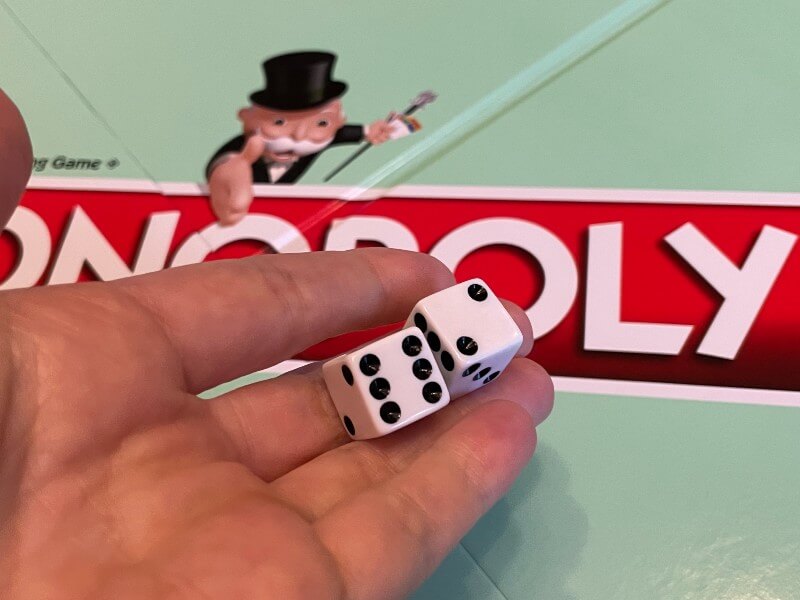
On Your Turn…
In a Monopoly turn, a player should roll both dice, move their token to the indicated number of spaces, and then carry out any actions for the space on which they land.
Once done, all players can then carry out any additional actions. A turn ends when the next player rolls.
It’s important to note that anyone can carry out additional actions during the phase between you carrying out the action on the space you land on, and the next player rolling. These actions can include buying houses and hotels, or making trade offers.
So you don’t have to wait until your turn to offer a trade or to buy properties – but if the next player rolls, you have to wait until they have moved their token and carried out the action needed for the space they land on.
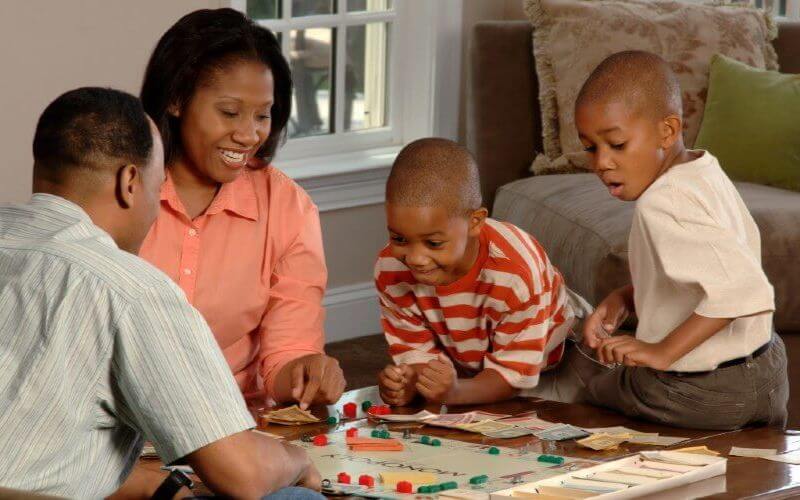
Rolling Doubles
If you roll doubles in Monopoly (the same number on both dice) then you must roll again, once you have carried out the actions for the space you land on.
Roll three doubles in a single turn and you must go directly to Jail.
Despite it being classified as a single turn, consider each roll as being like its own turn – so players can trade or buy properties between your first and second roll, and between your second and third roll if you were to roll doubles again.
You must carry out all actions for the spaces you land on before you roll a second time after getting doubles. The only time this is different is when you roll a third set of doubles. When that happens, don’t move your token to the property you would have landed on. Instead, just go straight to Jail.
Read more: Rules About Rolling Doubles in Monopoly
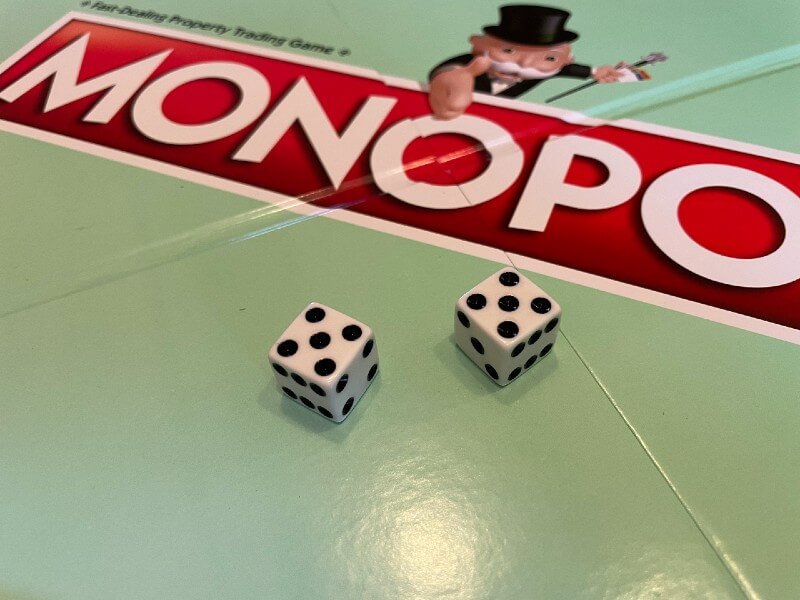
Monopoly Trading Rules
You are permitted to trade with other players in Monopoly whenever a player has completed their roll of the dice and the action for the space they land on, and before the next player rolls. You can trade properties, cash, and Get Out Of Jail Free cards.
You can make a trade offer to any player in the game, and it’s up to you what you offer. The other player can then either accept your trade, reject it, or negotiate a better deal.
You cannot trade any properties that have houses or hotels on them. If you wish to get rid of these properties, you must first sell the houses and hotels back to the bank. Houses and hotels can’t be traded.
Read more: Monopoly Trading Rules & Strategies to Win
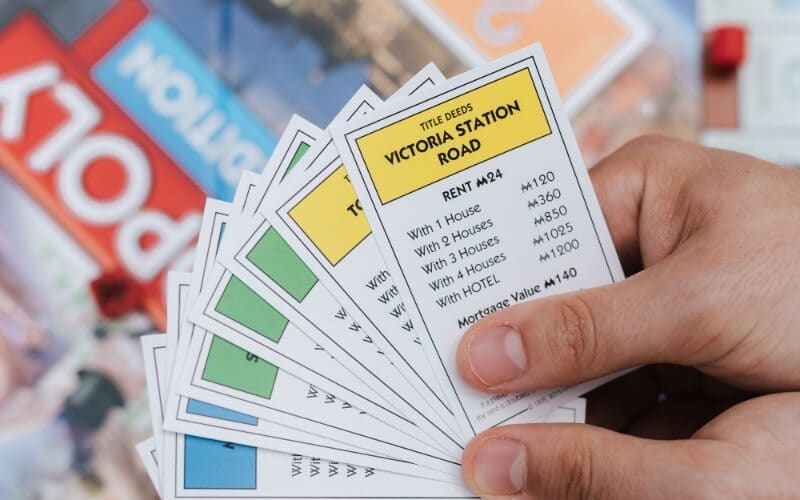
The Monopoly Board
A game of Monopoly is won or lost based on the spaces that you land on, and how you then act. So let’s look at what all the different spaces mean, and how they work.
Properties
There are 8 different color sets of properties in a game of Monopoly. Six of these color sets contain three properties, with only the first (Brown) and last (Dark Blue) containing fewer, with two.
Players can buy a property to own it, and then other players must pay rent when they land on the space.
Players can increase the amount of rent due by owning all properties in a set, and then building houses and hotels.
When you buy a property, you pay the cost of it to the bank. The banker will then give you a card, which has the information for that property including rent prices, house prices, and mortgage costs.
Properties can be traded, provided they don’t have houses or hotels on them. Properties can also be mortgaged, earning back some money but voiding rent payments until they are unmortgaged.
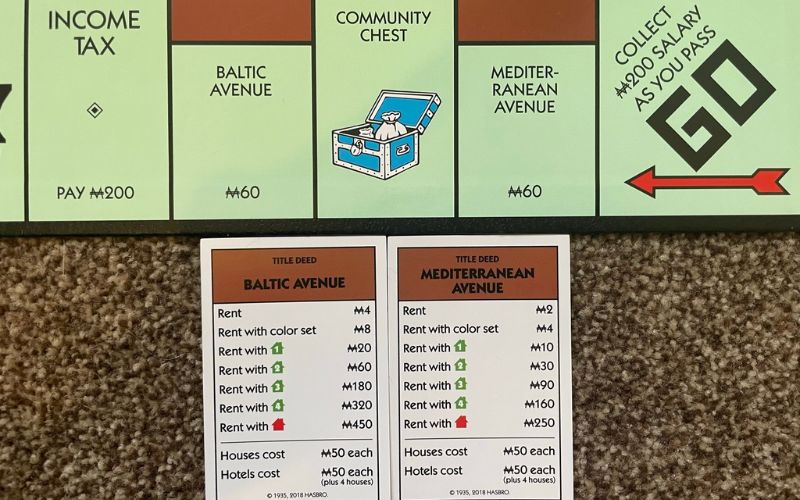
Railroads
Railroads are similar to property spaces, in that players can buy them to own them, and then other players must pay rent.
However the rent rules work differently, and no houses or hotels can be added. There are four railroads in every game of Monopoly, on the middle space along each side of the board.
Railroads, like properties, can be traded and they can be mortgaged.
Read more: Monopoly Railroad Rules
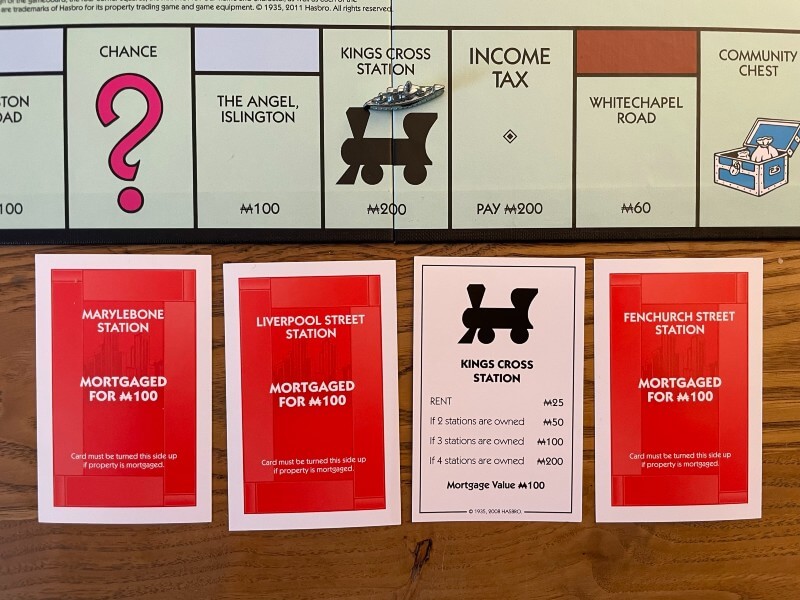
Utilities
Utilities are the third type of property in the game. There are two utilities in the game, the Water Works and the Electric Company.
Once owned, other players must pay rent when landing on these spaces, but the rent is calculated based on dice rolls.
Again, the utilities can be traded and they can be mortgaged.
Read more: Monopoly Utilities Rules
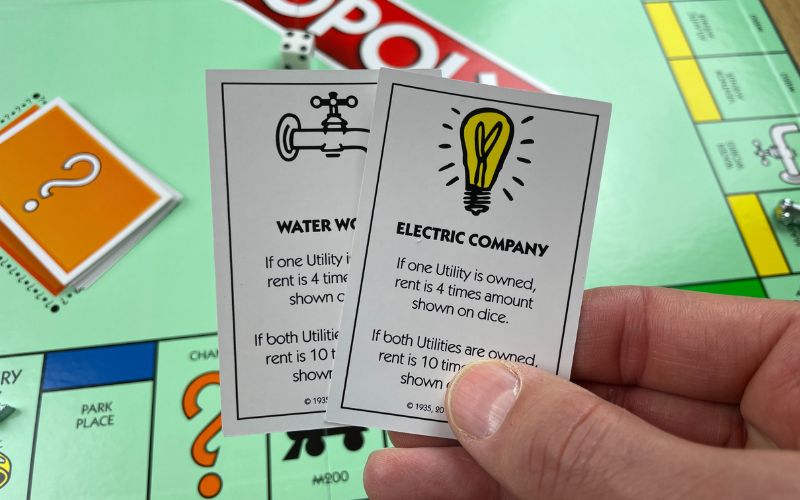
Chance & Community Chest
When a player lands on a Chance or Community Chest space, they must take the top card from the pile and carry out whatever action the card states, immediately. The only exception are the Get Out Of Jail Free cards, which can be kept until they are needed.
Once a player has carried out the action on a card, they should return it to the bottom of the pile of cards in the game.
In theory, if the spaces are landed on enough times, the same cards will come up again. They shouldn’t be removed from the game once used.
Read more: The Difference Between Community Chest and Chance
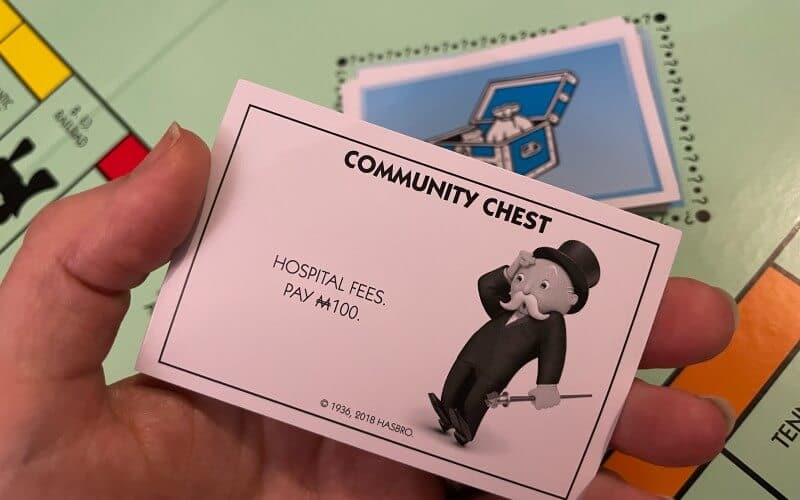
Jail and Just Visiting
The Jail space is where you are sent if you land on the Go To Jail space, if you roll 3 doubles in a row, or if you draw a Chance or Community Chest card sending you there.
If you land on the Jail square, you are not in Jail, you are ‘Just Visiting’ with no consequences. So you can place your token at the side.
If you are in Jail, you can still collect rent, buy houses and hotels and make trades with other players. You just can’t move around the board. On your turn, you can either roll to see if you get a double to get out of Jail, use a Get Out Of Jail Free card, or pay a $50 fine.
If you fail to roll doubles on three consecutive turns, you are forced to pay the fine and you leave Jail.
Read more: Monopoly Jail Rules Explained
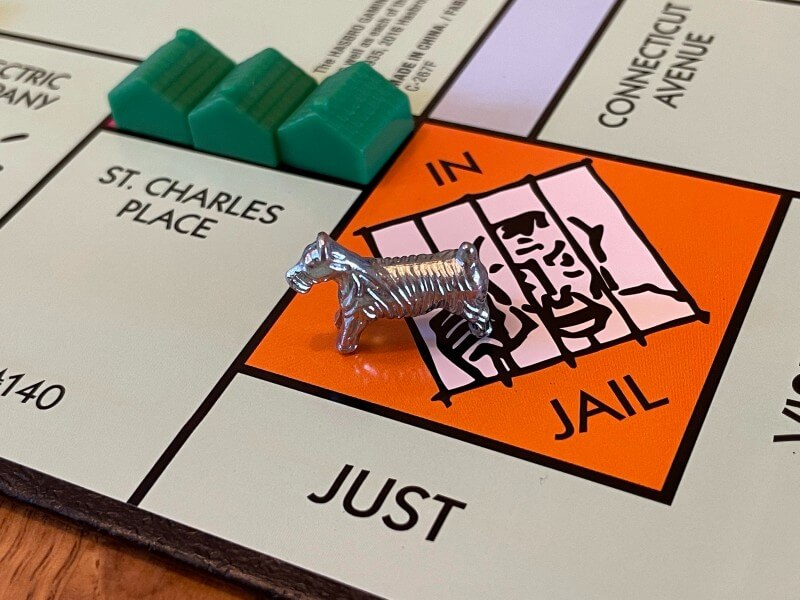
Free Parking
The Free Parking space does not have any actions or consequences. Consider it a breather space. Fines should not be paid to this space, despite a very popular house rule – this drags out the game. Free Parking should not reward players for landing on it.
Read more: Monopoly Free Parking Rules Explained
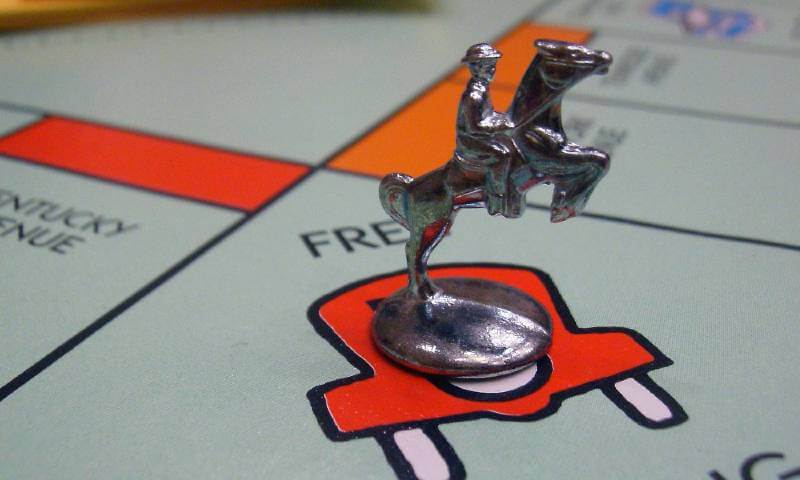
Go
The Go space is where players start the game. You don’t count the Go space when making your first moves in the game.
When you pass or land on Go, you collect $200 from the bank. You don’t collect any extra for landing directly on Go, despite a popular house rule.
If you land directly on Go, you take your $200 then, and you don’t collect any money on your next turn from the bank for ‘passing’ Go. It is a single payment for every trip around the board.
Read more: Monopoly’s Passing Go Rules Explained
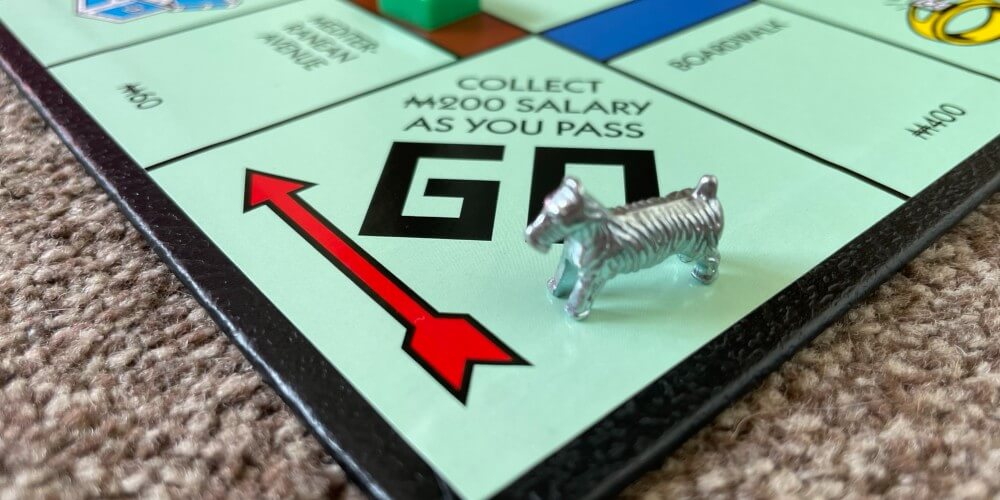
Tax
There are two Tax spaces on the board – Income Tax and Luxury Tax. (In some countries such as the UK, Luxury Tax is called Super Tax).
When you land on these, you must pay the required amount directly to the bank. The money must go to the bank, and not be placed under the Free Parking space for other players to collect if they land on it – that is an unofficial house rule.
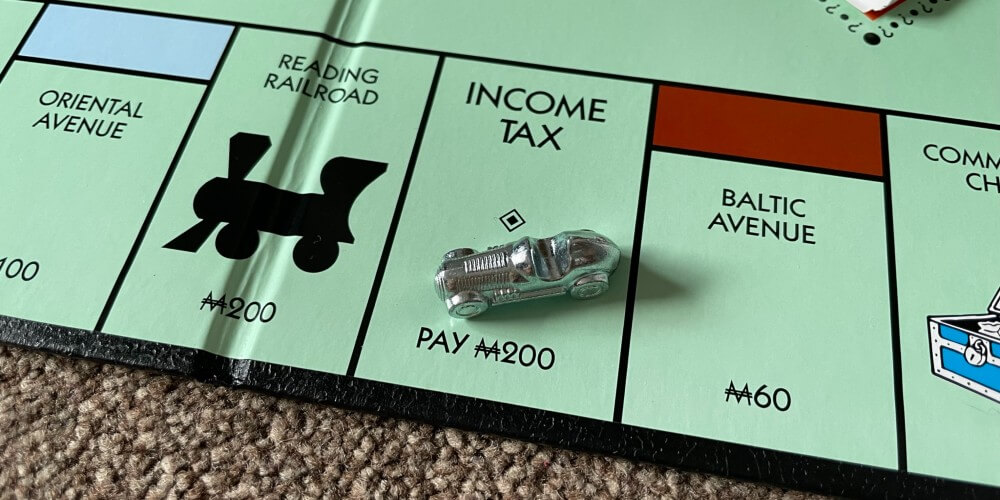
Monopoly Rules
Auction Rules
When you land on an unowned colored property, railroad, or utility you must either buy it or auction it.
If the player landing on a property declines to buy, an auction begins, and the highest bid takes the property.
There are no set rules for how an auction should be played out. You can make a bid during an auction at any time, it does not have to go in turn around the players (although it’s good manners if you do that).
Once no player is willing to go above the highest bid, the property is sold to the winner for that amount. This means you can get properties very cheap – if your opponent has very limited cash and they land on a property, you can bid for just over the amount they own. They can’t mortgage properties during an auction to raise more cash.
Read more: Monopoly Auction Rules Explained
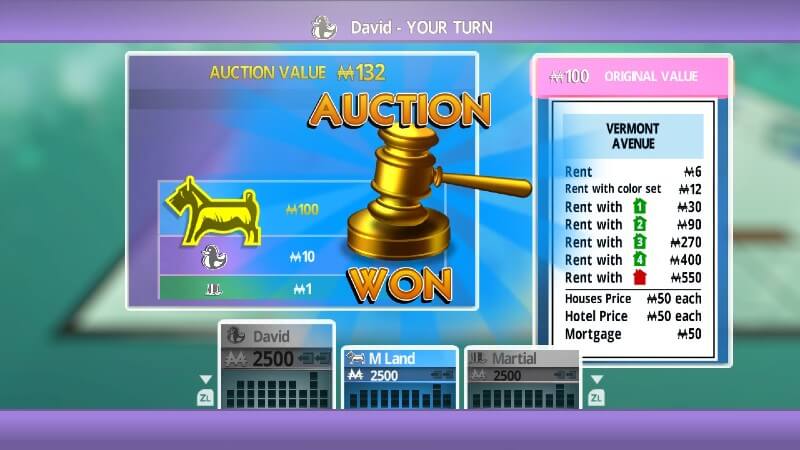
House and Hotel Rules
Once you own all the properties within a color set, you can start to build houses on them. You can’t build before this.
You must build evenly – so you can’t build two houses on a property until all other properties in that color set have one house. Hotels can be bought once four houses are on each property.
A single hotel is the maximum that can be placed on a single property – you can’t add a hotel and extra houses.
There are a limited number of houses and hotels in the game, and this is by design. If you get down to the last houses or hotels and multiple people want to buy them, they must be auctioned off.
The cost of houses and hotels varies by property – you can find the cost on the property card for that property.
Houses and hotels can’t be traded. They must be sold back to the bank instead if a player wishes to sell or trade that property.
Read more: Monopoly Hotel Rules
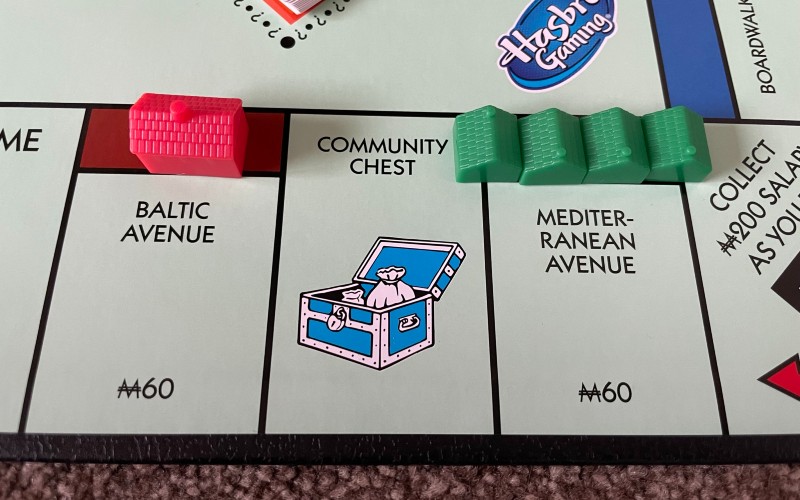
Rent Rules
The real key to winning a game of Monopoly is in charging other players rent, and causing them to go bankrupt. Here’s a rundown of the rent rules.
Rent for Properties
The rent for a property varies – the further around the board it is, the more rent costs. Rent prices double if you own all the properties in a color set, and then continue to increase as you add houses and hotels.
Rent prices at the start of the game are generally quite low – to win, you need to try to gain a color set and build on it so that you can start charging much higher rent amounts.
Read more: Monopoly Rent Rules Explained
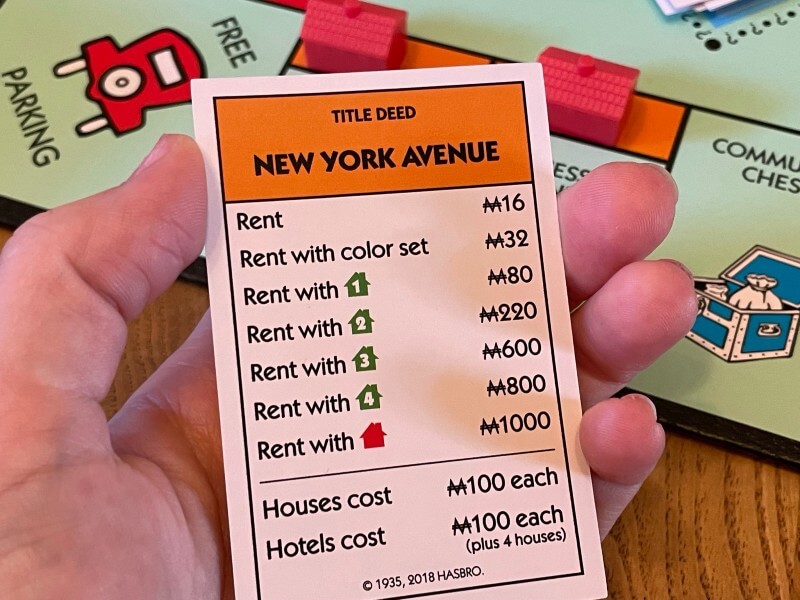
Rent for Railroads
The rent for railroads is fixed, depending on how many railroads you own.
- Rent with 1 railroad: $25
- Rent with 2 railroads: $50
- Rent with 3 railroads: $100
- Rent with 4 railroads: $200
Read more: Monopoly Railroads Rules
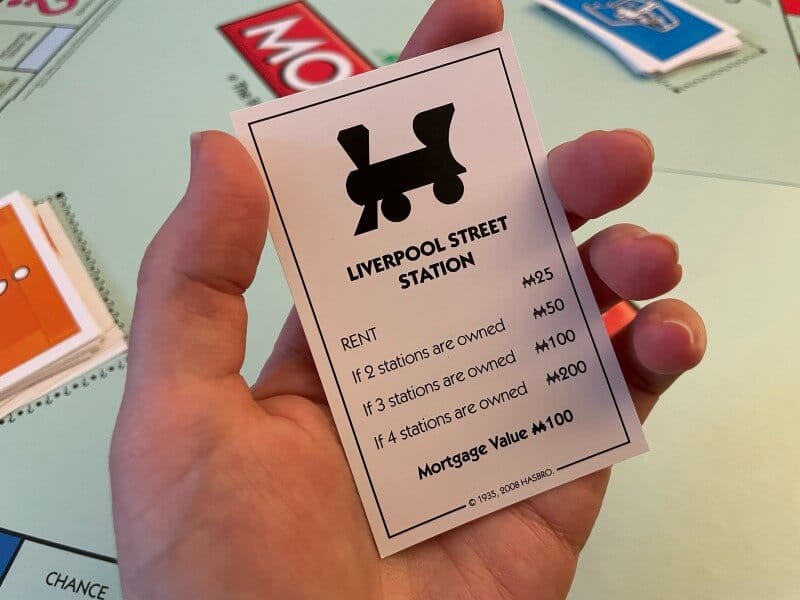
Rent for Utilities
The rent that you charge for the Waterworks and Electric Company utilities depends on how many you own, and the value of the dice the player rolled to land on your space.
If you own one utility, multiply the dice roll by 4. If you own both, multiply it by 10.
So if a player lands on a utility with a double-1, and you only own that utility, you would charge them the dice roll (2) multiplied by 4, so $8.
But if you own both, and they land on the utility with a double-6, you charge them the dice roll (12) multiplied by 10, so $120.
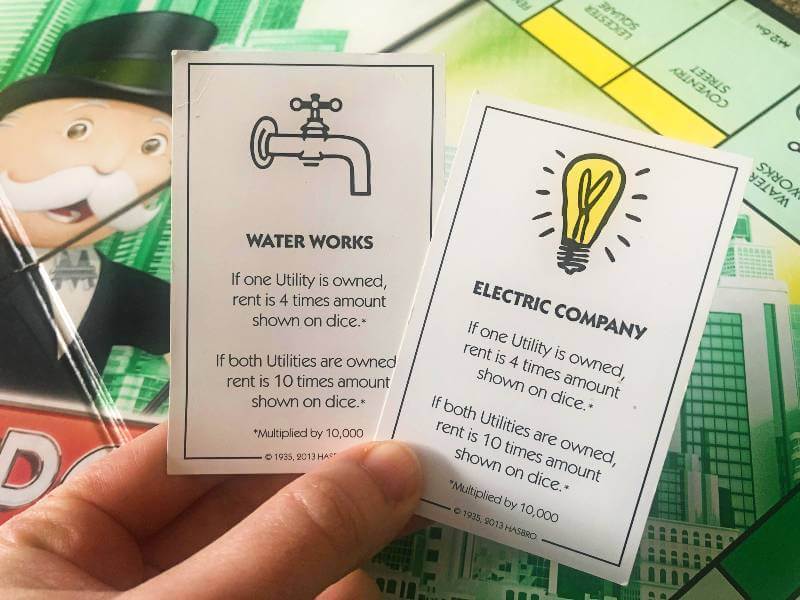
Rent must be asked for
A little-known rule in Monopoly is that rent must be asked for by the player owning the property. If you land on a space owned by another player, and they don’t ask you for rent, and then the next player rolls the dice, they have missed their chance.
If they try to tell you that you owed them rent, let them know that the official rules state that rent must be requested during your turn. You no longer have to pay it.
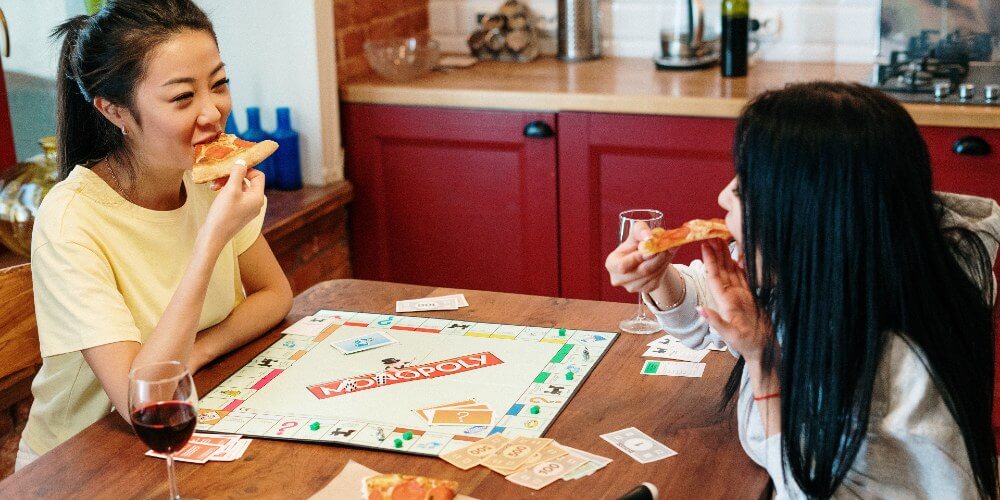
Can’t pay
If a player can’t pay the rent they own, they can either try to raise the funds by mortgaging their properties or trading them. If they still can’t raise the necessary funds then they go bankrupt.
If a player goes bankrupt to the bank, then all houses and hotels are returned and then the properties owned all go up to auction between the other players.
If a player goes bankrupt to another player, that player takes ownership of all the properties the player owned, including houses and hotels – this is the only way to receive houses or hotels from another player.
However, the player must either unmortgage any mortgaged properties, or pay a fee.
Read more: What Happens When You Run Out of Money in Monopoly
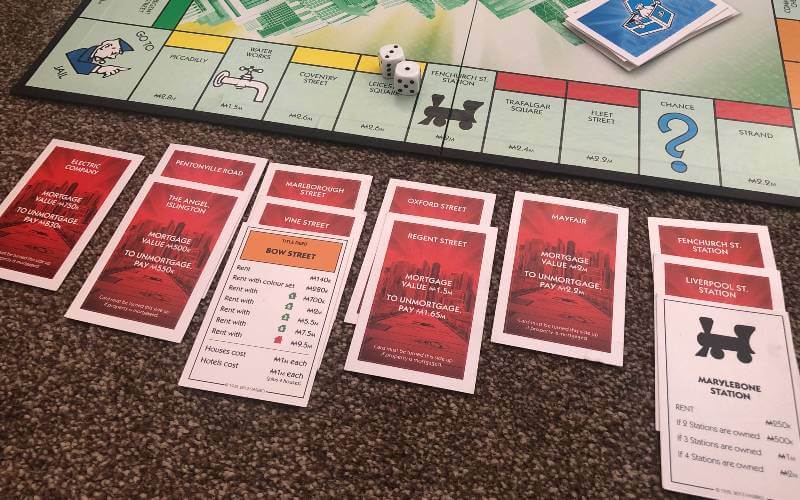
Mortgaging Rules
You can mortgage a property you own (including railroads and utilities) at any time. If you do so, you receive half the cost of the property from the bank, but you can’t collect rent on it until it is unmortgaged. Players should turn over the title deed card for that property.
You can unmortgage a property at any time, but you must do so by paying back the mortgage value plus an extra 10%.
If a mortgaged property is traded to another player, or gained by a player due to bankruptcy, the new owner must either unmortgage it immediately for the mortgage value plus 10%, or they can wait but then that 10% becomes 20%.
So for a $200 property, the mortgage value would be $100. For the player who owned it to unmortgage it, it would cost $110. If traded to another player, they can either pay $110 immediately to unmortgage it, or wait and pay $120 later.
Read more: Monopoly Mortgage Rules
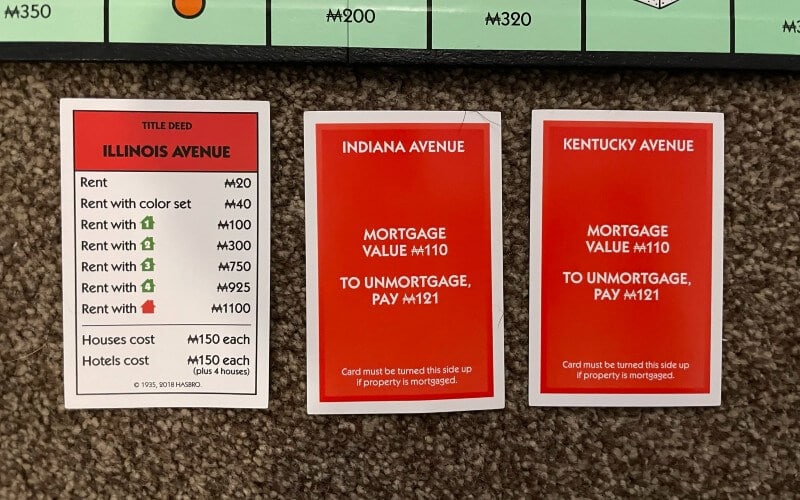
General Rules
Winning the game
You win Monopoly by being the last player in the game once all others have declared bankruptcy. Games of Monopoly should take no longer than 60-90 minutes if you play by the official rules, but house rules can slow it down.
Read more: How Does Monopoly End?

Teaming up in Monopoly
There is nothing in the rules of Monopoly to stop you from forming a temporary alliance with another player, but it’s unsporting if you team up against a solo player. Only one player can win so teams can’t last forever.
You also can’t ignore the rules as part of a team game, such as by offering to ignore all rent payments. Although in theory, you could make a deal where you didn’t ask for the rent from a teammate, that would be very unfair to other players, and it would make the game last a very long time.
Read more: Can You Team Up In Monopoly?

Cheating
You can’t cheat in Monopoly if you want to play by the rules – which of course is the definition of cheating. If you want to cheat, play the Cheaters Edition of the game, where cheating is encouraged as a way of helping you win.
But if you’re playing classic Monopoly, don’t spoil it for everyone else by cheating. Of if you do, at least don’t get caught!
Read more: How to Cheat at Monopoly Without Getting Caught
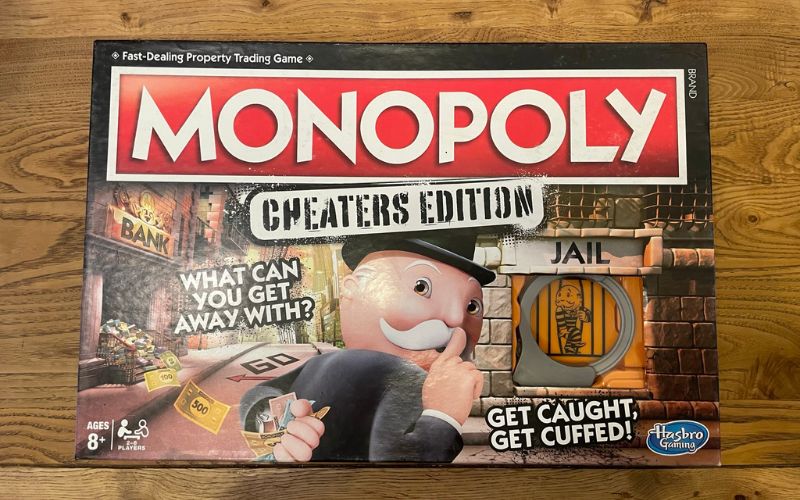
Final word
A lot of Monopoly game rules, right? In reality, you probably do know most of them already, and there may just be one or two that you weren’t clear on or that you didn’t realise were official rules – things like auctioning properties, or not paying fines to the Free Parking space.
Sticking to the classic Monopoly rules is the best way to keep games moving at a good pace, but you can introduce house rules if you like to mix things up a little. Just don’t be surprised if they change the balance – and length – of the game.
Read more: The Best Monopoly House Rules

